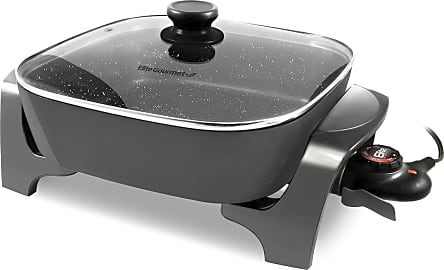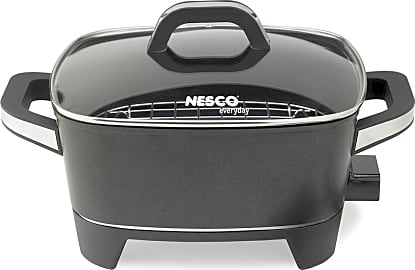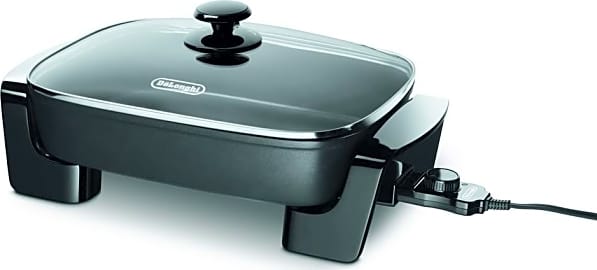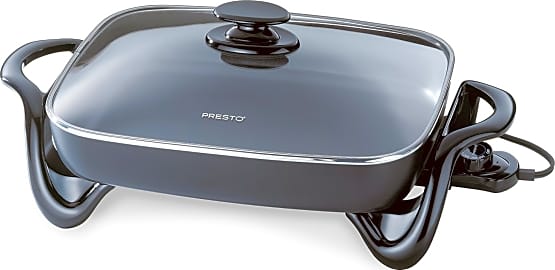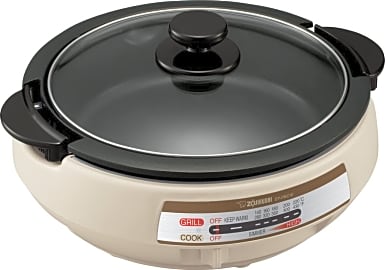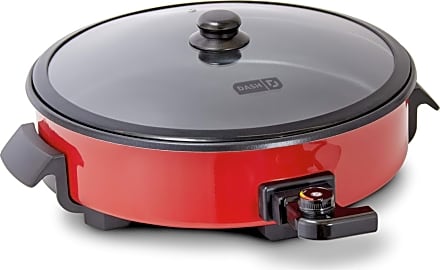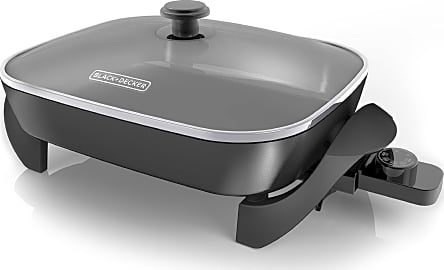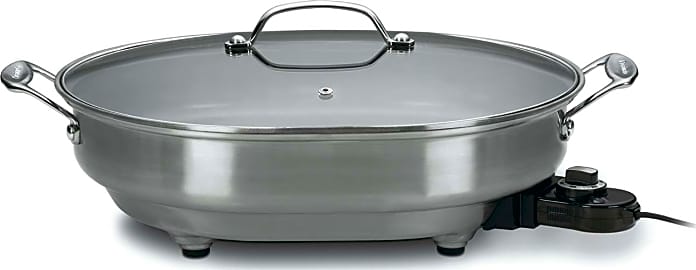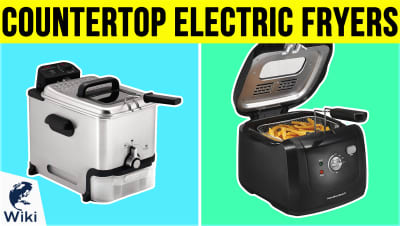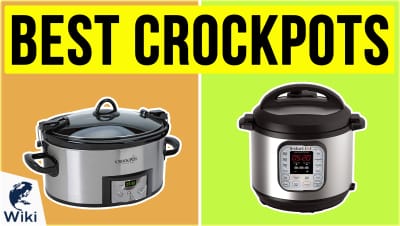The 9 Best Electric Skillets

This wiki has been updated 41 times since it was first published in March of 2015. If you don't have a stovetop or could use an extra cooking surface for when all your burners are taken, you should invest in an electric skillet. These modern fry pans can help you whip up just about anything, and on their lowest settings, they can keep your food warm while you serve. Choose from among a variety of shapes and sizes to meet all of your simmering and sautéing needs. When users buy our independently chosen editorial recommendations, we may earn commissions to help fund the Wiki.
Editor's Notes
July 30, 2021:
The only change made during today's update was the removal of a Hamilton Beach model that was both redundant and lacking in availability. We do want to mention the Cuisinart Oval, which is one of the few stainless-steel models on the market, making it a good choice for commercial catering outfits. The Presto Foldaway is still our all-around favorite to its good size and compact storage ability, but we also really like the De'Longhi BG45, just like we often like equipment from De'Longhi, for its premium construction and consistent operation.
July 28, 2020:
Like electric woks and electric fryers, these electric skillets are countertop appliances with their own built-in heating elements that are great when you’re short on burner space or want to conserve electricity. They’re available in a range of sizes and shapes, so you’re sure to find the right one for feeding either a large crowd or just one or two people. Today we added in the sturdy and reliable De'Longhi BG45, which provides a good value for the price, thanks to a fully embedded base that heats up consistently throughout, as well as a detachable thermostat that can be set to anywhere between 200 and 400 degrees Fahrenheit. Adjustable vents can help you release the right amount of steam, while a removable drip try allows for easy cleanup when dinner is done. A handy keep-warm setting lets your food remain heated if you need too finish preparing other dishes for your meal. It replaces the Precise Heat Rectangular in this update, which tends to suffer from uneven heating and some other quality control issues. Today we also replaced old models with newer versions of the Hamilton Beach 38529 and Zojirushi Gourmet d'Expert.
The Presto Foldaway remains in the top spot on our list, as you can’t go wrong with its large cooking surface, general ease of use, and features that allow for compact storage. Once it’s cooled, just pack the cooking surface inside the base, fold down the handles, and invert the lid to tuck it away into a cabinet. The pan is safe for the dishwasher as well as the oven, and a built-in spout makes it easy to pour out liquids, as needed. Another model from the same manufacturer, the Presto 06852, ranks highly on our list, thanks to its ability to heat up quickly and evenly, so you’ll get consistent results whether you’re preparing stew, a roast, or a casserole.
For another model that provides a lot of bang for your buck, look to the best-selling Elite Platinum Heavy Duty, which is made of thick cast aluminum that’s resistant to warping, and a nonstick coating with a honeycomb pattern. For a large selection from one of the biggest names in roaster ovens, consider the Nesco Extra Deep, which provides enough room for cooking a whole chicken. Heat is evenly distributed across the base, and its generous depth allows it to double as a deep fryer. As with many countertop appliances, the outside of electric skillets can become hot during use, so be sure to keep them away from the reach of children and pets, for safety's sake.
May 01, 2019:
Like many rectangular models, the Presto Foldaway has a 16-inch cooking surface, but it offers the added benefit of folding up for storage, making it ideal for those who are short on space, and the pan can be separated from the base and used in the oven. Made from stainless steel, the Precise Heat Rectangular is great for those who try to stay away from nonstick coatings. The Nesco Extra Deep has a smaller cooking surface, but its 4-inch depth can accommodate a whole chicken or other small roast, and it can also be used as a deep fryer. In addition to having a large capacity, the Dash Rapid is designed to heat up quickly, but it is prone to hot spots and sometimes has difficulty maintaining lower temperatures. The most versatile on the list, the Zojirushi Gourmet d'Expert comes with a deep pan as well as a flat plate, and it can even be used to steam vegetables, shellfish, and dumplings.
Special Honors
Cayenne Thermostatic Griddle Whether you’re looking to fry up some juicy burgers, tender chicken, or delicate fish, this sturdy gas griddle fits the bill. Its large surface provides plenty of cooking room, while its durable stainless steel body can stand up to years of use. Included are a regulator and a gas valve, and sturdy metal knobs protect the interior valves. vollrathfoodservice.com
Benefits Of An Electrical Skillet
They still offer all of the same benefits of a traditional skillet, though, like non-stick materials, a surface that heats evenly, and a large cooking area.
Electric skillets make a great addition to a collection of other multi-purpose cooking tools meant for compact spaces like crock pots and hot plates. In fact, among those three devices, one can make almost any dish they desire without needing a fully equipped kitchen. Electric skillets only require an electrical outlet to heat up, so they can save you money on your gas bill, and help you avoid the hazards that come with a gas stove. They still offer all of the same benefits of a traditional skillet, though, like non-stick materials, a surface that heats evenly, and a large cooking area.
Electric skillets come with added perks, too. Using these won't heat up one's kitchen as much as a traditional, stove-top variety would. This is especially nice during the summer months when cooking in a hot kitchen can be uncomfortable. Electric skillets also hold your desired cooking temperature much better than stovetop ranges, which are at the mercy of a flickering flame. That makes them perfect for frying foods like donuts and chicken, which require a precise and steady temperature.
Many electrical skillets also act as heated serving dishes so a cook can keep large portions of food warm, while they serve their guests. It's much safer to leave food unattended in an electrical skillet than on a traditional stove, too. If you do have a fully equipped kitchen, an electrical skillet can be useful during holidays when one makes dozens of recipes at once and needs extra cooking space. Plus, many of them stand on frames that look elegant and are perfect for dinner parties.
A Brief History Of The Skillet
Civilizations as old as those from ancient Mesopotamia, Greece, and Rome used frying pans. Older versions of the item were called spiders because they stood on three legs, and had a long handle. Many believe that the skillets used today in America evolved from 17th-century Dutch cast-iron frying pans, which didn't have legs and had lower sides because they were predominantly used for pancakes. By the 18th century, the spider style pan in the United States had shrunken down; it became a forged sheet iron pan with welded legs and a strap handle.
By the 19th century, the legs had been completely eliminated from American frying pans.
By the 19th century, the legs had been completely eliminated from American frying pans. They were still called spiders, but innovations in stovetops called for flat-bottomed pans. It was around this time that the spider formally took on the name skillet. Some theorize that the British started making these flat-bottomed skillets before the Americans. British cook and author Martha Bradley had a section called "Of Frying" in her 17th-century recipes book, which detailed foods that would almost certainly require the type of flat skillet that American's only started using more than 100 years later.
A man named Ivar Jepson received a patent for the first electric frying pan in 1956. In his reasons for creating the product, Jepson specifically mentions the ability to monitor temperature, and the fact that an electrical skillet can safely be left unattended for short periods of time. Jepson also talks about how wind or kitchen fans can affect cooking temperatures on traditional skillets, and how having the heating element and pan combined provides better temperature control. In 1964, after his first electric skillet saw much success, Jepson also filed for a patent for a model that could be fully immersed in water for cleaning purposes.
Tips For Baking In Your Electric Skillet
One of the ways to maximize a tiny kitchen is to use an electric skillet like an oven. Since most electric skillets come with a lid, they contain heat very well, just like an oven. Depending on what one is making, they can line their skillet with foil so that the outside of their food does not accidentally fry on the pan's surface, or the chef can place a baking pan inside of their skillet.
If you would like to make a cake inside of your electric skillet, line the pan with foil.
Some electric skillets even have a deep enough interior to contain a wire rack. This allows you to put a baking dish on the rack, inside of the pan. Once the lid is over the pan, the heat from the bottom can travel up and penetrate the ingredients, similar to the way it would in an oven. Because electric frying pans have temperature dials just like those found on ovens, you can set them to the exact temperature called for in the original baking recipe. This technique is great for dishes like chicken or pot roast.
If you would like to make a cake inside of your electric skillet, line the pan with foil. Turn the temperature dial to the required heat. When the pan is warm, pour the cake batter into the foil-lined skillet and place the lid on top. Make sure the lid is slightly off center, allowing some air into the cake. When the cake is done, simply remove the lid, place a large serving dish over the top of the pan, and turn it over. The cake should slide onto the platter.


